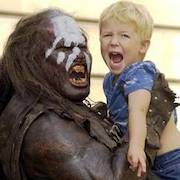|
 I found this curio in an antiques store the other day. A comic and surprisingly detailed accounting of early American history. It seems to have been written in the 1880's and reissued in the early 10's. Pretty cool to see how the people of the time thought of the colonists, the revolution, and the early republic. I would post some more pictures, but finding some that aren't horrifically racist is pretty challenging. There is a funny joke about sending the Declaration as a telegram though 
|
|
|
|

|
| # ? May 22, 2024 04:59 |
|
Wanting to read a one volume bio of Churchill, Iím having trouble choosing between Roberts and Jenkins.
|
|
|
|
I'm starting Tariq Ali's Winston Churchill: His Times, His Crimes, I'll let you know how that goes
|
|
|
|
What does everyone think about Ian Kershaw's two-volume biography of Hitler? (Hitler, 1889-1936: Hubris and Hitler, 1936-1945: Nemesis)? Anything in particular wrong, outdated, or weird about it?
|
|
|
|
Casey Finnigan posted:What does everyone think about Ian Kershaw's two-volume biography of Hitler? (Hitler, 1889-1936: Hubris and Hitler, 1936-1945: Nemesis)? It remains the definitive account.
|
|
|
|
Shimrra Jamaane posted:It remains the definitive account. how is volker ullrich, i have the first volume on my audible and never got around to listening to it?
|
|
|
|
they're both solid, but IIRC ullrich is a bit less granular than kershaw
|
|
|
|
My mom is going to Cuba in February and asked me for book recommendations on Cuban history, so I thought I'd ask here. For reference, she already got a copy of Aviva Chomsky's History of the Cuban Revolution and she downloaded all of the episodes of Blowback S2. I would say that something aimed more at popular/undergrad audiences than something more technical would probably appeal to her more.
|
|
|
|
The 17th century (and early 18th) are a huge blind spot for me. Any recs about the great northern war? Or the anglo dutch war?
|
|
|
|
Chairman Capone posted:My mom is going to Cuba in February and asked me for book recommendations on Cuban history, so I thought I'd ask here. For reference, she already got a copy of Aviva Chomsky's History of the Cuban Revolution and she downloaded all of the episodes of Blowback S2. I would say that something aimed more at popular/undergrad audiences than something more technical would probably appeal to her more. Your mom sounds cool. Maybe she would like Jon Lee Anderson's book on Che?
|
|
|
|
Count Thrashula posted:The 17th century (and early 18th) are a huge blind spot for me. Any recs about the great northern war? Or the anglo dutch war? Not quite what you're asking for, but Steven Pincus (NOT Pinker)'s 1688: The First Modern Revolution looks at the Glorious Revolution in the context of the 17th century modernization programs of both France and the Netherlands and argues that it was the outcome of a debate over whether England should take a French or Dutch approach, with the latter winning out. Mantis42 posted:Your mom sounds cool. Maybe she would like Jon Lee Anderson's book on Che? Thank you! She's pretty cool. And yes, I think the Che book might be of interest - good suggestion!
|
|
|
|
Chairman Capone posted:My mom is going to Cuba in February and asked me for book recommendations on Cuban history, so I thought I'd ask here. For reference, she already got a copy of Aviva Chomsky's History of the Cuban Revolution and she downloaded all of the episodes of Blowback S2. I would say that something aimed more at popular/undergrad audiences than something more technical would probably appeal to her more. Helen Yaffe's We Are Cuba is a good history for the special period onwards written for laypeople.
|
|
|
|
Count Thrashula posted:The 17th century (and early 18th) are a huge blind spot for me. Any recs about the great northern war? Or the anglo dutch war? More an extended essay than a book but The Struggle for Stability in Early Modern Europe by Theodore Rabb is a fun read.
|
|
|
|
I've found myself falling down some wikipedia rabbit holes lately and realized I know almost nothing about history pre-Ancient Greece and how human societies emerged and organized themselves I'm looking for something (multiple book recommendations also welcome) that would cover the end of the Stone Age up to and possibly including the emergence of the Roman Republic. I'm not looking for a strictly Western perspective either, I'm hungry for info on what basically everyone was up to during those epochs I'd also prefer something that more-or-less went over the broad strokes so I can get my bearings first before taking deep dives into specific regions and populations Thanks!
|
|
|
|
God Hole posted:I've found myself falling down some wikipedia rabbit holes lately and realized I know almost nothing about history pre-Ancient Greece and how human societies emerged and organized themselves I strongly recommend Barry Cunliffe's Europe Between the Oceans 9000 BC-AD 1000. It's maybe 15 years old now so it's possible there's a bit more updated research on some of the things he discusses, but it's a fantastic look at how humanity lived and thrived and organized itself in what is now Europe from prehistory onwards. It's especially great at shattering preconceptions about prehistoric humans being somehow inferior or unsophisticated just because they didn't know how to make an iPhone.
|
|
|
|
God Hole posted:I've found myself falling down some wikipedia rabbit holes lately and realized I know almost nothing about history pre-Ancient Greece and how human societies emerged and organized themselves I'm reading David Graeber & David Wengrow's The Dawn of Everything right now and it's excellent. It attempts to reexamine early history with fresh eyes (and modern science), casting aside old assumptions like Hobbes' "life was nasty, brutish, and short" and Rousseau's "noble savages." It is about upending old, ahistorical assumptions about ancient cultures, how they communicated, how they were organized, and how they did or did not influence more modern societies. I'm only 1/3 of the way through it, but I feel confident recommending it already.
|
|
|
|
Richard J Evansí Pursuit of Power marks the third book Iíve read that uses Mr Toadís car in The Wind in the Willows as an illustrative metaphor for the condition of the gentry in the era. British people sure love that book.
|
|
|
|
God Hole posted:I've found myself falling down some wikipedia rabbit holes lately and realized I know almost nothing about history pre-Ancient Greece and how human societies emerged and organized themselves It's not a book, but the latest season of the Tides of History podcast is precisely this. He's just covered up to the Bronze Age Collapse, emergence of Iron Age Rome and China is next. e: and when I say "he just covered" I mean "he covered it over the span of 115 episodes, with a mix of narrative and interviews with academics working on this stuff, and is nearly done". Latest ep is on the Sea Peoples, so alllmost done. PittTheElder fucked around with this message at 17:30 on Oct 6, 2022 |
|
|
|
these all seem to be exactly what I was looking for, much appreciated!
|
|
|
|
Railing Kill posted:I'm reading David Graeber & David Wengrow's The Dawn of Everything right now and it's excellent. It attempts to reexamine early history with fresh eyes (and modern science), casting aside old assumptions like Hobbes' "life was nasty, brutish, and short" and Rousseau's "noble savages." It is about upending old, ahistorical assumptions about ancient cultures, how they communicated, how they were organized, and how they did or did not influence more modern societies. It does a good job upending a lot of ahistorical assumptions because itís very questionable in an academic and research sense and is much more of an ideological polemic than history. Thereís a reason why, with only a couple exceptions, the editorial reviews for the book are not from anyone in the field of Anthropology or evolutionary science and the one big name that stands out is James C. Scott who has a lot research in the field but is 85 years old now and has always written with a very open and clear argument in favor of Anarchism. Most every other review is by some publication like the Atlantic, Jacobin, New Statesman, etc. I would infinitely rather recommend a title like The Horse, the Wheel, and Language by David Anthony.
|
|
|
|
I recently finished Jerry Broton's This Orient Isle (published in the US as The Sultan and the Queen). It's about Elizabethan England's relationship with Muslim powers, mainly Morocco, the Ottoman Empire, and Persia. It was an immensely interesting and enlightening read. The topic of how complicated it was to juggle theological convictions with commercial, military, and diplomatic considerations was covered really well. For some of the book Broton follows the stories of the forays of significant English merchants, diplomats, spies and pirates in the Muslim world. Some show disdain for the religion and people they encounter, some are forcibly converted, and others convert willingly and rise to prominence in their adopted court. He also goes into how these topics were adapted by playwrights. I definitely have a deeper understanding of several of Shakespeare's plays.
|
|
|
|
PittTheElder posted:It's not a book, but the latest season of the Tides of History podcast is precisely this. He's just covered up to the Bronze Age Collapse, emergence of Iron Age Rome and China is next. I was also going to recommend this. It's about the most up to date and comprehensive thing on global prehistory out there.
|
|
|
|
Any good histories of Liberia? Would prefer a good general history from establishment to modern day
|
|
|
|
Any good books on the naval side of the American Civil War?
|
|
|
|
Count Thrashula posted:Any good books on the naval side of the American Civil War? Craig Symonds wrote The Civil War at Sea and Lincoln and His Admirals. Iím sure there are a lot of more specific works on the Hunley and the ironclads. I definitely read a lot of those as a kid.
|
|
|
|
I'm interested in knowing more about 20th Century China. Are the Frank Dikotter books considered a good source on that era?
|
|
|
|
Reset Smith posted:I'm interested in knowing more about 20th Century China. Are the Frank Dikotter books considered a good source on that era? I thought Mao's Great Famine was excellent, detailing policies and their effects in a very clear way, but also looking at very small-scale things through diaries and interviews. The latter can get really depressing, though. It is the only book I read on the subject, so I can't say how it compares to anything else out there.
|
|
|
|
Reset Smith posted:I'm interested in knowing more about 20th Century China. Are the Frank Dikotter books considered a good source on that era? They are the definitive source for the period he covers, yeah. He did the research during a fairly brief window when some researchers were allowed to read internal Chinese records, I don't know of anyone else who had the kind of access to source material that he managed. And yes they are not a fun and happy read. Tombstone by Yang Jisheng is also very good if you want another specific one on Mao's famine. Dikotter's books cover a wider time period.
|
|
|
|
BioTech posted:I thought Mao's Great Famine was excellent, detailing policies and their effects in a very clear way, but also looking at very small-scale things through diaries and interviews. Grand Fromage posted:They are the definitive source for the period he covers, yeah. He did the research during a fairly brief window when some researchers were allowed to read internal Chinese records, I don't know of anyone else who had the kind of access to source material that he managed. And yes they are not a fun and happy read. Thanks for the responses I'm gonna check them out.
|
|
|
|
Both the books by Dikotter and Yang Jisheng are absolutely first class scholarship on their subjects but I would be remiss to not mention that both authors in their books strictly cover the Mao period of 1949-76 which will leave you pretty lost if you want something starting with the turn of the century up to the establishment of the PRC. Jonathan Spenceís The search for modern China is a great overview of the early Qing to the 1990s.
|
|
|
|
Yeah that's true, if you're looking for general knowledge you need more. Anything by Spence is good. I have read kind of a lot of contemporary China books, some more recs of things I liked. A lot of these are more personal or "journalist talks to people" kind of stuff instead of academic histories. Heaven Cracks, Earth Shakes, James Palmer The Emperor Far Away, David Eimer Peter Hessler's books Age of Ambition, Evan Osnos Factory Girls, Leslie Chang Eating Bitterness, Michelle Loyalka Wild Swans, Jung Chang Red China Blues, Jan Wong These are 19th century but much of what happens in the 20th is triggered by the 19th. Autumn in the Heavenly Kingdom, Stephen Platt God's Chinese Son, Jonathan Spence China's Last Empire: The Great Qing, William Rowe Grand Fromage fucked around with this message at 18:24 on Oct 12, 2022 |
|
|
|
What sucks is that there are really no good detailed books on the Civil War. At least in English. In most books itís just kind of briefly thrown in between the end of WWII and the establishment of the PRC which unfortunately gives the unsatisfying impression that it was just some fate accompli that Mao was gonna win and what happened was always gonna happen. Which is surely the CCP line so that doesnít help the scholarship.
|
|
|
|
And it's extraordinarily rare to get good scholarship out of China since you're not allowed to publish accurate history. Tombstone is one of those rare exceptions, you'll be shocked it's banned in the mainland. Used to be able to do good work in Hong Kong but uh. I found this post when looking for warlord era, I have not read any of these but given the source it's probably not a bad list. https://www.reddit.com/r/AskHistorians/comments/gbpmm4/books_about_the_warlord_era_in_china/ Grand Fromage fucked around with this message at 19:06 on Oct 12, 2022 |
|
|
|
The dude was able to do his research for Tombstone because he lied about what he was doing the entire time.
|
|
|
|
I feel like feeling bad, does anyone know a decent book about United Fruit? I'd take a podcast or even a three-hour youtube video, too, if that helps dial in the general tone I'm looking for-- ie, more to the pop history end of it rather than academic.
|
|
|
|
neongrey posted:I feel like feeling bad, does anyone know a decent book about United Fruit? I'd take a podcast or even a three-hour youtube video, too, if that helps dial in the general tone I'm looking for-- ie, more to the pop history end of it rather than academic. One of the craziest things I've seen is a few years ago, when I was in Guatemala, some book store was selling a defense of United Fruit. That was crazy to see. Wish I could remember what it was. The first bonus episode of Blowback S2 is about the coup in Guatemala which covers some of the United Fruit stuff.
|
|
|
|
neongrey posted:I feel like feeling bad, does anyone know a decent book about United Fruit? I'd take a podcast or even a three-hour youtube video, too, if that helps dial in the general tone I'm looking for-- ie, more to the pop history end of it rather than academic. Try Peter Chapman's "Bananas".
|
|
|
|
Dikotter's books need to have a significant asterisk because he is so virulently anti communist which can be seen in his disdain for the people he is covering and bad faith perspective of their actions. I was able to understand Kotkin's perspective in his Stalin books but Dikotter is a different level. Edit: but I'm not sure if there are alternatives of the same scope and depth. I'd love to check them out. sleep with the vicious fucked around with this message at 22:47 on Oct 12, 2022 |
|
|
|
sleep with the vicious posted:Dikotter's books need to have a significant asterisk because he is so virulently anti communist which can be seen in his disdain for the people he is covering and bad faith perspective of their actions. I was able to understand Kotkin's perspective in his Stalin books but Dikotter is a different level. So...basically youíre looking for the Chinese scholarship version of David Irving?
|
|
|
|

|
| # ? May 22, 2024 04:59 |
|
Yang Jisheng's work is equally good. But it's not like there's a fundamentally different take or anything. All that stuff happened, it's well documented, plenty of living people remember it. Even the Party eventually admitted it happened during reform and opening in the 80s, though I wouldn't go talking about it today. There's not really a moral position you can arrive at other than disdain for the people who were responsible for tens of millions of deaths. Anything else would be denialism.
|
|
|









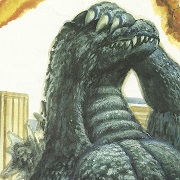


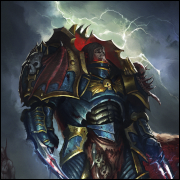


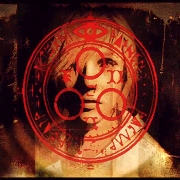
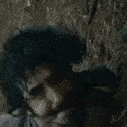


 Yes, it's like a lava lamp.
Yes, it's like a lava lamp.
